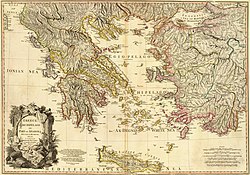
Back Argaïese Griekeland AF اليونان العتيقة Arabic Periodu arcaicu en Grecia AST Arxaika AZ Архаічная Грэцыя BE Архаична Гърция Bulgarian Època arcaica Catalan Archaické Řecko Czech Arkaisk tid Danish Archaik German
| History of Greece |
|---|
 |
|
|
Archaic Greece was the period in Greek history lasting from c. 800 BC to the second Persian invasion of Greece in 480 BC,[1] following the Greek Dark Ages and succeeded by the Classical period. In the archaic period, the Greeks settled across the Mediterranean Sea and the Black Sea: by the end of the period, they were part of a trade network that spanned the entire Mediterranean.
The archaic period began with a massive increase in the Greek population[2] and of significant changes that rendered the Greek world at the end of the 8th century entirely unrecognizable from its beginning.[3] According to Anthony Snodgrass, the archaic period was bounded by two revolutions in the Greek world. It began with a "structural revolution" that "drew the political map of the Greek world" and established the poleis, the distinctively Greek city-states, and it ended with the intellectual revolution of the Classical period.[4]
The archaic period saw developments in Greek politics, economics, international relations, warfare and culture. It laid the groundwork for the Classical period, both politically and culturally. It was in the archaic period that the Greek alphabet developed, the earliest surviving Greek literature was composed, monumental sculpture and red-figure pottery began in Greece and the hoplite became the core of Greek armies.
In Athens, the earliest institutions of democracy were implemented under Solon, and the reforms of Cleisthenes at the end of the archaic period brought in Athenian democracy as it was during the Classical period. In Sparta, many of the institutions credited to the reforms of Lycurgus were introduced during the archaic period, the region of Messenia was brought under Spartan control, helotage was introduced and the Peloponnesian League was founded and made Sparta a dominant power in Greece.
- ^ Shapiro 2007, pp. 1–2
- ^ Snodgrass 1980, p. 19
- ^ Shapiro 2007, p. 2
- ^ Snodgrass 1980, p. 13